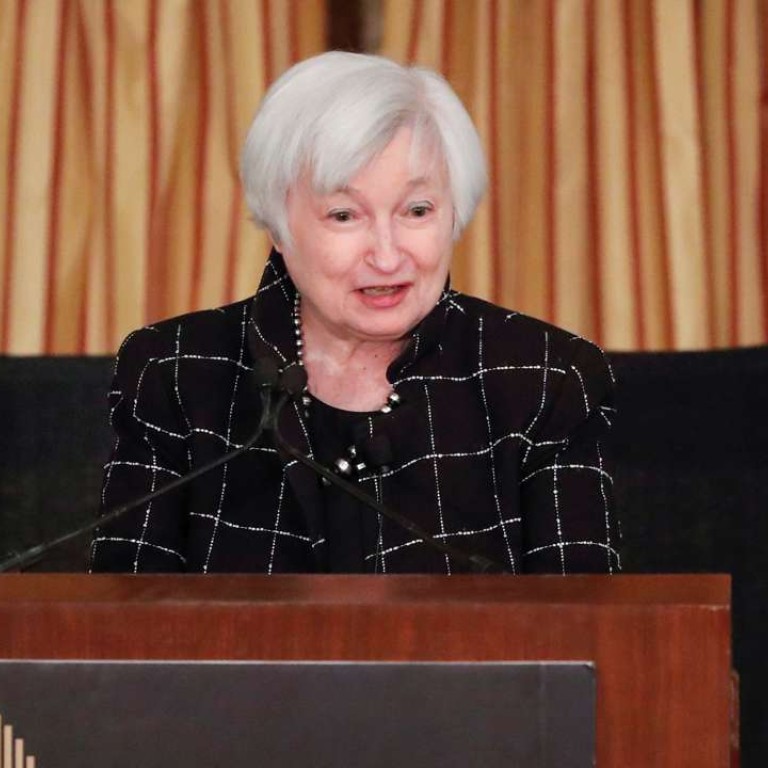
Fed’s looming rate rise to chill China equities, add downward pressure on yuan
The US Federal Reserve is set to raise interest rates on Wednesday, as February’s strong payroll data released last Friday has eliminated the final hurdle for the first tightening move since December.
Depreciation pressure on the yuan will increase in the near term, making it even more unlikely for Beijing to loosen monetary policy. But any negative downdraft in the stock market caused by jitters over the rate tightening move is likely to be only short term, according to analysts.
Data released on Friday showed US non-farm payrolls in February increased 235,000, beating consensus expectations and sending the unemployment rate sliding to 4.7 per cent from 4.8 per cent.
“The strong US employment report for February has all but sealed the deal for a rate hike this coming week,” said Oliver Jones, an analyst at Capital Economics.
Expectations that the Fed will raise the policy rate target 25 basis points to 0.75 to 1 per cent in March has added to depreciation pressure on the Chinese yuan.
There are some early signs that the onshore yuan has started to move against the US dollar in recent days, as the US dollar has been strengthening since early February.
The government, meanwhile, seems also to emphasise more on the flexible move of the currency.
“It is likely that the preference of the governor and the central bank is for more flexibility, in our view,” Goldman Sachs analysts wrote in a report, after a press conference attended by People’s Bank of China Governor Zhou Xiaochuan, and Deputy Governors Yi Gang and Pan Gongsheng.
In the 2017 report on the work of government Premier Li Keqiang put less emphasis on exchange rate stability and devoted less attention to the topic compared with last year’s report, which likely reflects greater recognition of the need to be relatively flexible going forward, Goldman Sachs said.
The work report, released during the annual National People’s Congress, reviews government performance in the past year and sets main targets for next year.
“[Their speeches] reinforces our view the market is underpricing the potential for a widening in the political risk premium, supporting our view for onshore yuan to move above 7 against the US dollar sooner rather than later,” said Sue Trinh,,head of Asia FX strategy at Royal Bank of Canada-Hong Kong Branch.
Haitong Securities analysts Jiang Chao and Gu Xiaoxiao cautioned that officials face a difficult balancing act in managing credit policy during a time of inflated prices, including concerns over a potential bubble in China’s real estate market, which makes it difficult to loosen monetary policy.
The Hong Kong stock market is likely to be dragged down in the short term, but longer term it will benefit from solid corporate earnings and attractive valuations, according to a research note by China International Capital Corporation.
“With China’s economic data coming out this and next week, the market may find some support should our optimistic views be verified,” CICC said.
China’s macro fundamentals are on a much more solid footing compared with a year ago, and the market’s focus this time around is more on the strength and sustainability of the visible economic recovery of China than the tightening alone, CICC said.
Even though the Fed will raise rates by more than investors are anticipating over the next couple of years, this will not spell disaster for risky asset markets, Jones said.
“After all, monetary policy is set to be tightened further against the backdrop of strengthening US and global economies,” he said.
The bigger issue, however, is how fast the Fed is going to raise interest rates.
“The Fed, in our judgement, is now more data dependent and therefore it is too soon to signal intentions for the June FOMC meeting since the outcome will depend on the pace of job creation over the next three months,” said Conrad DeQuadros, an analyst at Smartkarma.
The labour market, however, appears to have considerable momentum and, if this momentum is maintained, the Fed will raise rates again at its June meeting following a rate hike next week, DeQuadros said.
Analysts at China Merchants Securities say the near certain March rate rise comes as stable domestic conditions in the US and abroad provide a window to push through a policy tightening to help counter a potential uptick in inflation.
But they believe the Fed will only lift rates two to three times this year, given uncertainties related to the US economic recovery and the impact of the Trump administration’s economic policies.
“We think there is a big chance for the Fed to raise the rate in June again,” China Merchants Securities analysts said.

